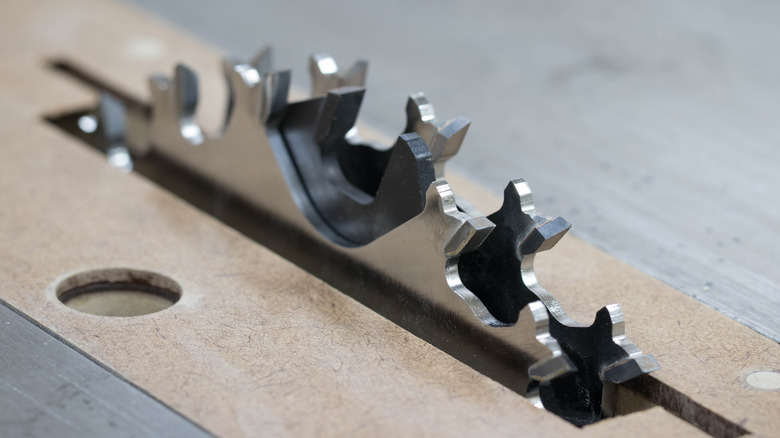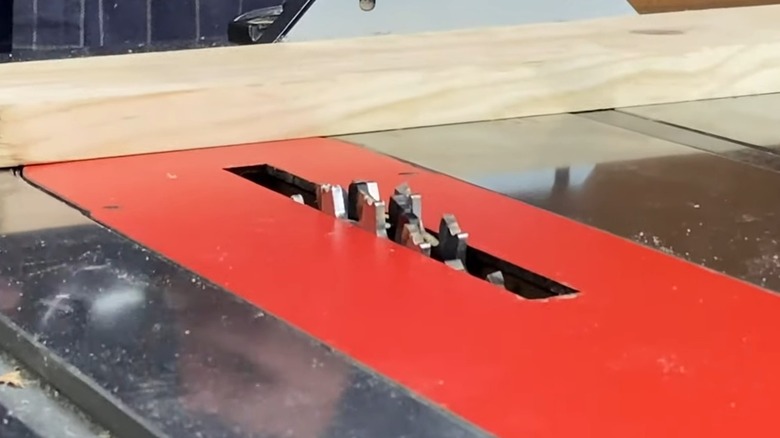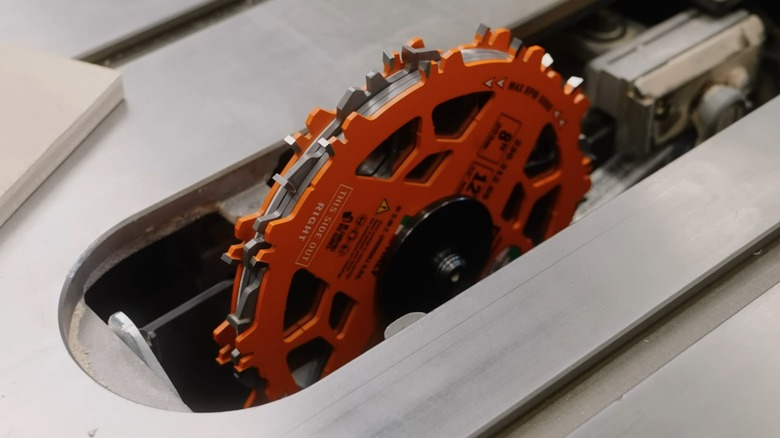What Are Dado Blades In Woodworking? Here's What They're Used For
To the uninitiated, woodworking might just look like cutting, drilling, and sanding without a whole lot of finesse. In reality, as any woodworker would tell you, there's more to it than generic hand saws and sandpaper. It's a highly involved, specific job, regardless of what one has on their workbench. Thus, it requires specific tools and accessories to get the intended results. There are plenty of woodworking tools out there under $100 worth investing in that all woodworkers should have around, as well as those needed for certain jobs that won't be essential for everyone. Case in point, dado blades.
Not all woodworking saw blades are made the same, with dado blades having a specialized purpose. These are designed for circular saws, with their cuts leaving behind wider than average grooves in the cut wood, known as dados – hence the name of this blade variety. As far as their use, they make cuts intended for interlocking wood pieces. They're often used to cut pieces for bookshelves, door panels, and other similar constructs so that they fit together snugly. Dado blades are also excellent for cutting out rabbets, which are the channels along the edge of wood pieces, if need be.
Naturally, not all dado blades are the exact same. There are differences between them that make some better for specific jobs than others.
The variations of dado blades
Like many types of saw blades, dado blades vary in a few key ways. First and foremost are the different formats available, with the stack dado — consisting of two scoring blades and one or multiple chipper blades — being the more common of the bunch. These can be customized to some extent with the inclusion of shims, which are set between the scoring and chipper blades to increase the width of the cut. Meanwhile, the wobble dado is a single blade on an offset rotation that is used for more custom cuts, while a single-blade groover dado makes narrower cuts, typically around 1/4-inch.
Getting even more in-depth, there are several available dado blade sizes, further increasing the customization potential. Diameter-wise, the average dado set comes in at 8 inches with a thickness of 1/8-inch — though smaller 7-inch and 6-inch blades are out there. There's a bit more range when it comes to chipper thickness, including 4-1/8 inches, 1-1/16 inches, and 1-3/32 inches. None of these sizes are particularly better or more helpful than the others. At the end of the day, which size you need comes down to your needs and what you want your final cut to look like. Of course, just make sure you're not using dado blades with Harbor Freight's Hercules table saw since they aren't compatible.
With so much use and customizability, dado blades are certified staples of carpentry. However, there is a misconception out there that these blades are illegal to use, which isn't quite the case.
No, dado blades aren't illegal
There's an undeniable level of danger when it comes to dado blades and saw blades in general. A very quickly-spinning saw blade can do a number on flesh and bone, hence why to use a bandsaw, like those from the major brands out there, a table saw, or any other bladed carpentry tool, you need to know what you're doing. Throughout the years, though, the potential danger of dado blades has put them at the center of a far-reaching myth. It claims these blades are illegal in some regions of the world, such as the United Kingdom. In reality, this isn't true. These blades are just as legal there as they are in the United States, Canada, and other areas, but the law doesn't completely ignore such tools in the workplace.
In the UK, the Health and Safety Executive sets regulations regarding workplace health and safety. When it comes to saw blades, it requires that any machinery using them must see their blade stop within 10 seconds of power being cut. Due to their increased weight, dado stacks take longer to stop than other blades — though they're typically still within the accepted legal range. Dado blades are also unguarded, which the HSE is very adamant about the use of, so one would have to be added to remain legal. Thus, dado blades aren't banned or illegal to own and use in the UK — it's just that workplace regulations might make them difficult to use.
Dado blades are handy woodworking elements that carpenters around the world can get use out of. You'd be hard-pressed to find a job such a blade, or set of blades, couldn't contribute to, especially if you take the time to customize to your liking.


